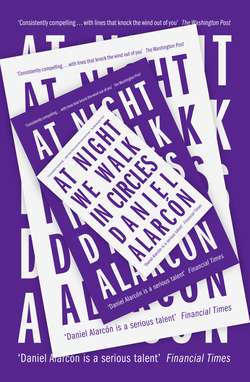Читать книгу At Night We Walk in Circles - Daniel Alarcon - Страница 13
6
ОглавлениеHENRY, PATALARGA, AND NELSON set out on April 16, 2001, on a night bus to the interior. That evening, in the bus station waiting room, the television news reported that a famous Andean folksinger had been killed by her manager. Groups of young men huddled together, sharing their titillating theories behind the murder, who had slept with whom, how the killer might have succumbed to the terrible logic of jealousy. Entire families sat glumly, staring in shock at the television, as if they’d lost a loved one—and they had, Nelson supposed.
The bus would leave in an hour. He drank a soda, ate plain crackers. It was practice for the austerity to come, for the rigors of life on the road, the cold, the rain. Patalarga and Henry had spent much of the last days painting vivid portraits of the misery that awaited, and each horrifying description seemed to fill them with glee. “City boy,” they'd said to Nelson, “how will you ever survive life in the provinces?”
Now, at the station, the television spat out the latest news, confirmed and unconfirmed: the accused killer was on suicide watch. An accomplice was being sought. Tearful fans were already gathering in front of the deceased’s home, laying flowers, holding candles, comforting one another. The singer had been dead for all of three hours.
“How do they know where she lives?” asked Henry. “Who told them?”
“Lived,” said Patalarga.
Nelson had only a vague notion of who this dead singer was. In this bus station, on this night, among these fellow travelers, admitting such a thing would be like declaring oneself a foreigner. He’d always been taught it was two different countries: the city, and everything else. Some lamented the stark division, some celebrated it, but no one questioned it. Tonight, their bus would leave the city, and tomorrow when they woke, they’d be in the provinces. In truth, here at the bus station, where everyone was in mourning, it was as if they were already there.
“Did you say your good-byes?” Henry asked, interrupting his daydreams.
“I did.”
Henry furrowed his brow, very serious. “Because we’re entering the world of the play now, Alejo, its constructed universe. Give in to it.”
“I’m giving in.”
“Once we leave, none of this exists.”
Nelson glanced about the crowded and dilapidated bus station. A few yards from them, a child slept on an uneven pile of luggage.
“It’s so hard to say good-bye.”
Henry threw a gentle arm around Nelson. “I know it is, Alejo. I know.”
They were called to board just before midnight. The waiting room of the bus station came to life as everyone shook off their drowsiness and stepped out into the warm night. The bus idled loudly. The passengers lined up to force their overstuffed bags into the hold. There were smiles on most of the faces, Nelson noticed; no one was immune to the allure of travel. Even a night bus has some glamour, if only you let yourself see it.
Just before the bus pulled out, a thin boy in a baseball cap came aboard. He was chewing gum, and held a small video camera in his right hand. The boy moved slowly down the aisle, panning left to right and back again, stopping for a second or two on each passenger. Some smiled, some waved, some blew kisses. Henry flashed an enthusiastic two thumbs-up. When the camera came to Nelson, he stared dumbly into the lens, not quite understanding.
Henry whispered in his ear. “Smile. In case we plunge off a cliff and die, this is how your mother will remember you.”
Nelson forced a smile.
When I went to the bus company to ask for this video, I was all but laughed at. “Are you serious?” the man asked.
I told him I was. I had the date, destination, and time of departure.
“If no one dies,” he said, “we just record over it.”
The ride out of the city was slow, but after an hour they came to the capital’s eastern limits. Nelson didn’t sleep but looked out the window instead, hoping to see something that might catch his eye. There was only darkness. A movie came on the bus’s television—the kind his mother would have liked—but he tuned it out, and went over the script instead, replaying The Idiot President in his mind: its rhythms, its atmosphere, its famous gloom, which, contrary to what he’d been told, was in fact completely describable.
Henry hadn’t known at the station how right he was, exactly how hard Nelson’s good-byes had been. He’d arranged to see Ixta that afternoon, at a park in La Julieta. As they strolled, talking about nothing in particular, Nelson, with his heart thrumming in his chest, held a parallel conversation with himself: Should he, or shouldn’t he? Was now the time to tell her? It was a warm day by the sea, and the vastness of the ocean was always remarkable to him. The boardwalk was full of joggers and skateboarders, and the sun shone through a scrim of early-autumn clouds hovering at the edge of the horizon. The longer they walked, the quieter they became, until Nelson couldn’t bear his uneasiness. They’d come to another seaside park, this one with an unused lighthouse surrounded by a low wooden fence, so short you could step over it. Many had—they’d written their names, pairs of them, mostly, along the lighthouse’s curving base of white brick.
